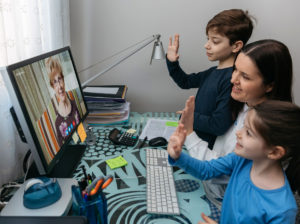As a therapist, I regularly have the privilege of coming into and sharing your lives. Recently, I have also had the privilege of coming into your homes through online telehealth, as the coronavirus emergency continues. So I thought I would share a general view of how we are doing.
I get a view of various people, from those who are working at home, to those who still have to go to work one or more days per week, to those with kids who are not in school but are “going to school” online, to those who have been thrown out of work, to those on disability and were not working before the pandemic, to those with small businesses that have been thrown into crisis, to those who are vulnerable with pre-existing conditions, to those who suspect they have already had the coronavirus, although they cannot confirm it through testing.
And the word from the home front is that we are doing okay, considering the circumstances. We are adjusting.
 This is not to say that some of my clients have not suffered high anxiety and have had to find ways to manage it. It is not to say that some of us have not felt lonely and have had to find new ways to reach out to others.
This is not to say that some of my clients have not suffered high anxiety and have had to find ways to manage it. It is not to say that some of us have not felt lonely and have had to find new ways to reach out to others.
It is not to say that many of us have not begun to go a bit stir crazy. It does not mean some of us are not bored, casting about for something to do, unable to go to work or hang out with friends.
It is not to say that some of us do not miss our previous ways of getting exercise and are having to find new ways to exercise at home or in our neighborhoods.
It does not mean that it has not raised more family or couples conflicts, as we are kept home longer and in greater proximity.
It is not to say that some of us do not wonder whether or when we will work again and are not anxious about making ends meet. It is not to say that the small business owner has not had to endure harrowing changes to continue to do business.
It is not to say that most of us have not pondered whether to go to the grocery store or have our groceries delivered, and find peril or difficulty in either option.
It is not to say that most of us do not worry about a vulnerable loved one, if indeed we ourselves are not susceptible to dire consequences from some pre-existing condition.
It is not to say that many of us are not struck daily with the bad news of more people dying. It is not to say that some of us have not experienced someone dying.
It is not to say that some of us do not worry when we will be able to return to a kind of normal. It is not to say that many of us do not wonder what the world will look like after COVID-19.
It is to say that for those of us forced to stay home that we are finding our way. We are finding silver linings, like more time in our lives, not having to commute, more time with family members, more connections with friends and family through Zoom calls.
It is to say that we are adjusting our mental attitudes to deal with how the world has changed.
It is to say that for those of us who worked at home before, who were stay-at-home parents, or who are disabled, some things have not changed a lot, except that we know the world outside is a different place.
It is to say that we at home are contributing. We are not on the front lines with the health care workers, the grocery clerks, the workers in fields and factories, the essential office staff, the first responders, who continue to deliver essential goods and services. We are the rear guard. As we stay at home and social distance, we combat the virus.
And we seem to be adjusting. As one of my clients said, we humans are adaptable. I support each of you as you adapt, for you are doing your part as a member of the rear guard.
We will get through this. Unfortunately, we will lose some people, but we will get through this.